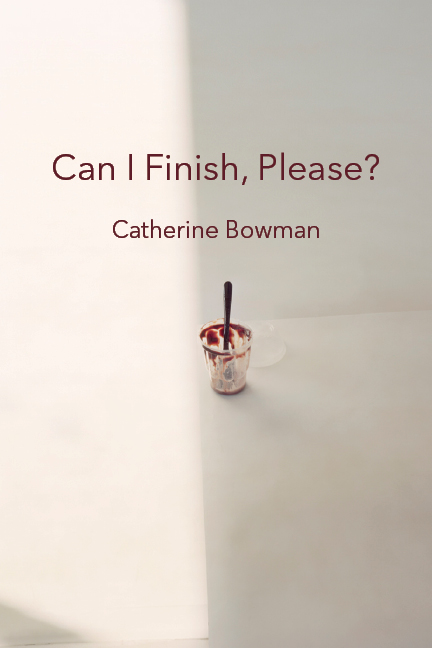
paper • 121 pages • 15.95
ISBN-13: 978-1-935536-66-6
Not-quite-woman, not-quite-man, not-quite-animal, not-quite-flower: the poems in Can I Finish, Please? are shape-shifting acts, lyric interruptions that crave and resist completion, where the mutable self and the world are made and unmade over and over. These poems explore hungers, from appetite to hedonistic consumption, from prayer to a yearning for generative resolution. An exiled couple remakes a ruined world out of buttons and string; tools give advice on love; a magic walking stick guides a speaker through haunted stone quarries; beds turn into musical instruments; a great antlered deer lives inside a locket; flowers transform into frogs, dogs, hobos in a lecherous garden that howls and laments on the violence we do to each other and the world. Pain and loss are recognized as necessary elements in the making of a self.
from “Walking Stick,” from Can I Finish, Please?:
…You charm me across rope bridges
and lead me to what was never lost,
where the future becomes past.
Tonight under this full moon,
a dense tuft of fox hair
caught in a rose briar shines.
Here where I walk through my own night,
the night I offer to you as my own.
Walking Stick, where am I?
Grinding at the ground—
To go over a river where there is no river
and dream a dream I can’t remember to dream.
To come on a cloudless night.
To reason with the wind on a path.
Smoke follows beauty, he said.
…Bowman, whose previous collections include “1-800-HOT-RIBS,” writes incisively about human hungers (both erotic and spiritual) and invents her own breed of magical realism in poems that astonish, interrupt and delight. Like Ginsberg, Bowman is a poetic descendant of Whitman, often using repetition and cascading syntax to propel her lines forward…. Read the full review here.
…Here, as everywhere in this collection, Bowman’s finely calibrated, ornate, diction creates an experience that is at once ethereal and earthy, simultaneously peephole and tented field, a rookery for tears and joy…. Read the full review here.
What Bowman seems constantly to ask is what can we save from our pasts? What is tangible, and who do we lose to the distortion of our own memory, our own points of view? These jangling, off-balance, often sneakily meditative poems are among the most interesting and formally inventive I’ve read by any living writer.
This poetical homage politicizes Sylvia Plath, showing her to be less a victim than a citizen of her time, whom history can misrepresent but not silence….Bowman’s work shifts the posthumous perception of Sylvia’s incantatory aspirations as not neurotic, but heartbreaking
Catherine Bowman viewed Plath’s personal effects, cut-outs, and drawings, and they inspired her to produce a remarkable series of poems. By consulting The Plath Cabinet, we can perceive….a sort of idolatry of the feminine that was later refigured into an iconoclastic attack in the greatest of Plath’s poems. Bowman draws attention to the idolatry, moving us inside the divided mind that would turn against itself through a violent rejection of feminine ideals and then through self-violence. Bowman approaches a predecessor as obsessed with the desire to speak as with the desire to shut up or be shut up